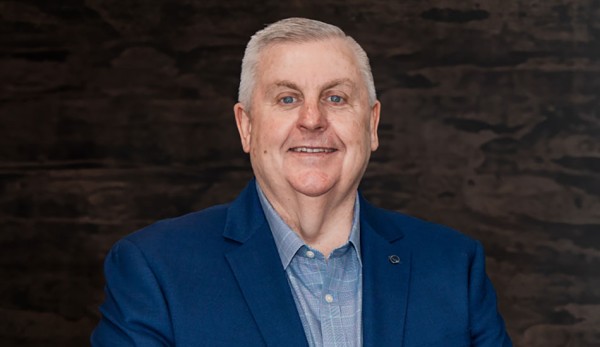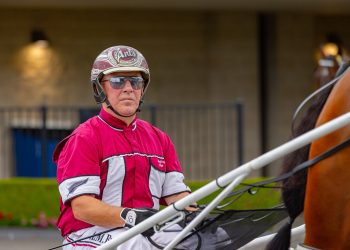Australian Brad Steele has recently been appointed as the new CEO for Harness Racing New Zealand.
Having worked in a variety of senior roles in the banking and insurance industries, Steele has also had a lifelong interest and involvement in harness racing. He is the current Chairman of Albion Park Harness Racing Club, he was the former Chair of Queensland Harness Racing and is a former Board member of Queensland Racing.
He will take up his new role with HRNZ on the 1st July.
Brad recently spoke to me about his love harness racing and his hopes and aspirations for his new role.

How long have you been involved in harness racing?
“I’ve been involved probably forty years and that’s being a breeder, an owner, administrator or punter. So I’ve been exposed to all levels of harness racing.”
Have you bred or raced any good horses?
“I’ve been fortunate enough to have had a horse that finished second in the New Zealand Cup – Cobbity Classic. I don’t think any horse would have beaten Flashing Red that year. He’s probably the best racehorse I’ve had.”
Have you bought any horses from New Zealand?
“We’ve probably bought a dozen horses out of New Zealand over the past ten to fifteen years, mainly from the South Island. Pete McMullen and Chantel Turpin are our trainers as well as Darren McCall. I’ve also got a share in a horse with Kyle Marshall.”
Were you shoulder tapped to apply for the HRNZ position?
“Some people made me aware that the role was going. I found that I was spending more time thinking about harness racing and less time about banking so that told me it was time to move on. I certainly went through a thorough process to get to the final outcome.”
Do think it’s an advantage coming into the role from outside of New Zealand?
“I see it as an advantage. I’m coming into the role without any knowledge of the past, no biases, and no preconceived ideas around certain things, particularly around politics.”
As some time has passed since former CEO Gary Woodham resigned, is there some urgency for you to get things done quickly?
“Yes absolutely. I think we need to pick off the main priorities that need addressing, the one’s that are going to have the greatest impact. I think there is that urgency to get into the business, stabilise the industry, rebuild the momentum and accelerate our growth.”
Do you regard this job as one of your most challenging?
“Yeah, I’d say so. I’ve never had a role that isn’t challenging. Good meaty roles always come with their challenges but I see challenges as opportunities. It excites me that I can come in and try to make a difference to the industry.”
Are you on a fixed term contract?
“Three years and that’s subject to my performance over that period of time. At the end of that three years if everyone is happy with my performance I’m not sure what the options would be from there. I want to get stuck in and really don’t want to wait three years to get the business moving. I certainly would want to be making some progress within the first six to twelve months.”
Tell me about some of the changes you implemented at Albion Park.
“The first thing we did was to modernise the branding of Albion Park and bring it into the twenty first century. We introduced a completely new membership model. I played an integral role in the Constellatins Carnival. I didn’t come up with all the ideas and we worked really closely with Racing Queensland. Finally, the Ultimate Drivers Slot Series which we launched a couple of weeks ago.”
Will you be introducing any of those changes in New Zealand?
“I probably need to get my mind around what’s actually in place already. I’m not across all those details. Certainly the lens I’ll be coming in with is that innovation is the lifeblood of progress, and it really fuels hope. So I’ll certainly be looking at where the opportunities are to introduce some new innovation.”
One of our biggest challenges is our diminishing racing stock. Have you got ideas around how we utilise what we have and grow our numbers?
“I do have some early ideas which I’d need to float past the Board. I can see that a lot of kiwi horses are sold to America and Australia and the breeding stock is being sold as well. We’re certainly seeing that challenge. I think there are a number of opportunities that we can look at to try and slow down the movement. I also appreciate that it’s an important source of income. We just need to balance things up before we make any final decisions.”
What are your thoughts on the current handicap and ratings systems run in New Zealand?
“There are handicapping and rating challenges here and in Australia. I do think there are opportunities particularly with the two and three year olds and to have more age racing so we don’t force those younger horses to participate against more seasoned and better performed horses. I’d like to work with the industry and HRNZ to find out how we can make it a more fair and equal grading system. The more aged racing that we can put on the better it is, and I think it would extend the life (racing life) of those horses and hopefully retain them in New Zealand.”
Will there be any changes at HRNZ and the way the business operates?
“To be honest I’m not totally across the operating model at HRNZ. Certainly, one of my first goals is to have a look at how the business is set up. The first thing I’ll look at is what the strategy for Harness Racing New Zealand is and make sure that the operating model ably supports that and helps deliver that strategy.”
The breeding industry is going through its own struggles with a diminishing gene pool. Do you have any thoughts on how that can change?
“I think there’s a lot of opportunities there, but I probably need to sit down and talk to industry people. I heard this morning that Diamond Creek Farm is potentially looking at sending twenty horses to the Southern Hemisphere to breed. I’d like to find out how we can influence that and how it’s set up in New Zealand. I also think, and this is not a criticism but more of an observation, that over the years the kiwi breed has lost its uniqueness and that’s because a lot of the great breeding stocks in New Zealand have been bought and sent to Australia. Now they’re breeding from those kiwi breeds. For me it’s how we can get more of that kiwi uniqueness back into our pedigrees.”
Entain have become the saviour of racing in New Zealand. You come from the same state as their boss Dean Shannon. Have you had much to do with Dean?
“I’ve known Dean for over twenty years and Ladbrokes are “The Creeks” major wagering partners. Dean is very passionate about racing and he’s got lots of harness racing interests. Certainly my observation is that Entain have certainly blown some wind into the sails of harness racing in New Zealand. There is still a lot of work we need to do to capitalise on that but I’m extremely happy that Harness Racing New Zealand is partnering with Entain and the TAB. I think that was an outstanding decision.”
At the moment compared to galloping, harness racing is receiving limited marketing exposure. Do you have plans to change that?
“I’ll be looking to work with the right people at the TAB and Entain. I think there’s an opportunity there to certainly enhance it but I’m also mindful that you can chop up quite a lot of money in marketing campaigns as well. I’ll be very keen to see what the current marketing strategy is. I do have a few ideas which I’d be happy to float past the HRNZ Board once we get up and running.”
There has been talk of the Auckland Trotting Club incentivising owners to send their racehorses north to help top up their fields. What are your thoughts of that idea?
“I think any positive idea that is going to increase the horse pool in the North Island is a good idea. Clearly we’ve worked with the TAB and Entain to increase the race dates in the north and I think that’s the right strategy. We’re going to have to have that horse pool in the north to ensure we get the maximum out of this particular strategy. It will feed through to wagering which will ultimately lead to more prize money. Any concept that’s going to increase the horse pool in the north is a good one but conversely we also need to make sure that we’re also protecting where it’s appropriate, the racing in the south as well.”
Are you a fan of running race series that lead to a higher staked final?
“I am. I’ve seen it work very successfully in the past here in Queensland. They were extremely successful so I am a big supporter of that concept.”
New Zealand has to attract the next generation of young people into our sport as drivers and trainers. Any thoughts around this area?
“It’s something I’ve been thinking about in the last couple of weeks. I’ve seen a number of the younger participants leave New Zealand and head to Victoria. I’m also mindful that some of the best trainers in New Zealand are on the other side of fifty. I do have some initial thoughts that I presented to the HRNZ Board recently and how we approach retaining the talent we have got. It’s like building a succession plan so that we’ve always got that talent coming through and they don’t have to leave New Zealand to broaden their business. To do that I think infrastructure is going to play an important role as a lot of harness racing properties start to be bought out by property developers. Entry to get into harness racing can be quite expensive by the time you purchase your land and set up your property. I think it’s going to be a massive barrier for the future so I do have some ideas of how potentially we could go about setting up state of the art training and education centres for harness racing in New Zealand. We’re really going to need that to make sure our industry is built to last.”
Do you think Harness Racing New Zealand is doing enough work around communication?
“I probably don’t have enough knowledge around that. What I would say is there’s always room for improvement no matter what jurisdiction you’re in. For me it’s not just communication but educating people on why we do things. I don’t like to deal in too much complexity. I like to break things down to make it as simple as possible.”
I understand there are lots of ideas and concepts sitting there ready to go. These will need to be delivered quickly?
“Certainly, I’ll be looking for some quick wins. I do know the Board and staff at HRNZ have been working on a few concepts which are not quite finalised yet but I hope once I get my feet under the table there will be a couple of quick wins. There is that sense of urgency that we do need to stabilise the industry really quickly but at the same time rebuilding that momentum.”
What excites you most about the sport in New Zealand?
“It’s the opportunity to grow the business. Now that we’ve got Entain on board and the TAB I think there are significant opportunities for harness racing in New Zealand.”
by Bruce Stewart, for Harnesslink

 USA
USA Canada
Canada Australia
Australia New Zealand
New Zealand Europe
Europe UK / IRE
UK / IRE



